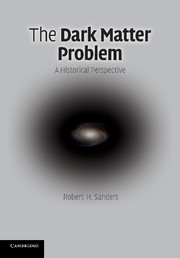Book contents
- Frontmatter
- Contents
- Acknowledgements
- 1 Introduction
- 2 Early history of the dark matter hypothesis
- 3 The stability of disk galaxies: the dark-halo solution
- 4 Direct evidence: extended rotation curves of spiral galaxies
- 5 The maximum-disk: light traces mass
- 6 Cosmology and the birth of astroparticle physics
- 7 Clusters revisited: missing mass found
- 8 CDM confronts galaxy rotation curves
- 9 The new cosmology: introducing dark energy
- 10 An alternative to dark matter: modified Newtonian dynamics
- 11 Seeing dark matter: the theory and practice of detection
- 12 Reflections: a personal point of view
- Appendix Astronomy made simple
- References
- Index
1 - Introduction
Published online by Cambridge University Press: 05 July 2014
- Frontmatter
- Contents
- Acknowledgements
- 1 Introduction
- 2 Early history of the dark matter hypothesis
- 3 The stability of disk galaxies: the dark-halo solution
- 4 Direct evidence: extended rotation curves of spiral galaxies
- 5 The maximum-disk: light traces mass
- 6 Cosmology and the birth of astroparticle physics
- 7 Clusters revisited: missing mass found
- 8 CDM confronts galaxy rotation curves
- 9 The new cosmology: introducing dark energy
- 10 An alternative to dark matter: modified Newtonian dynamics
- 11 Seeing dark matter: the theory and practice of detection
- 12 Reflections: a personal point of view
- Appendix Astronomy made simple
- References
- Index
Summary
My purpose here is to discuss the past and present of the dark matter hypothesis: how it has developed that most astronomers and physicists now believe that the matter content of the Universe is dominated by an unseen, non-luminous substance that interacts with ordinary matter, protons, neutrons and electrons, primarily through the force of gravity. This description is personal and based largely upon my perspective as an interpretive astronomer. It is also necessarily biased. Throughout most of my career, for the past 40 years now, I have been involved – at times peripherally, often directly – in research on the discrepancy between the detectable mass of astronomical systems and the inferred Newtonian dynamical mass. Since my graduate student days, I have worked at institutes where consideration of this problem, both theoretical and observational, has been a dominant theme. My views on these developments are certainly colored by my experience at these particular institutes and, no doubt, by my own prejudices. But I do hope that the account that I will give here is reasonably honest and fair.
Forty years ago, I was a graduate student at Princeton University. In the Peyton Hall basement, every Wednesday, there was a lively lunch meeting attended by staff members and students. Theses projects would be described, new ideas would be tossed out and batted around, and often politics (in that lively rebellious period) would be discussed in a highly dialectical manner.
- Type
- Chapter
- Information
- The Dark Matter ProblemA Historical Perspective, pp. 1 - 10Publisher: Cambridge University PressPrint publication year: 2010



